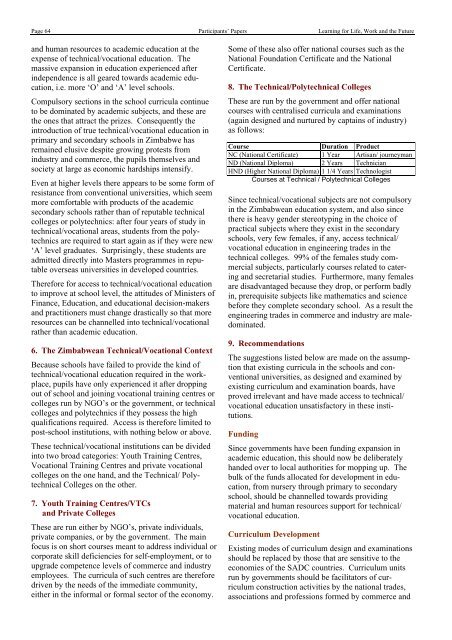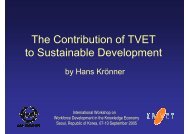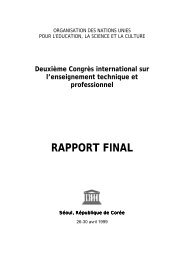Learning for Life, Work and the Future Initial ... - Unesco-Unevoc
Learning for Life, Work and the Future Initial ... - Unesco-Unevoc
Learning for Life, Work and the Future Initial ... - Unesco-Unevoc
Create successful ePaper yourself
Turn your PDF publications into a flip-book with our unique Google optimized e-Paper software.
Page 64 Participants’ Papers <strong>Learning</strong> <strong>for</strong> <strong>Life</strong>, <strong>Work</strong> <strong>and</strong> <strong>the</strong> <strong>Future</strong><br />
<strong>and</strong> human resources to academic education at <strong>the</strong><br />
expense of technical/vocational education. The<br />
massive expansion in education experienced after<br />
independence is all geared towards academic education,<br />
i.e. more ‘O’ <strong>and</strong> ‘A’ level schools.<br />
Compulsory sections in <strong>the</strong> school curricula continue<br />
to be dominated by academic subjects, <strong>and</strong> <strong>the</strong>se are<br />
<strong>the</strong> ones that attract <strong>the</strong> prizes. Consequently <strong>the</strong><br />
introduction of true technical/vocational education in<br />
primary <strong>and</strong> secondary schools in Zimbabwe has<br />
remained elusive despite growing protests from<br />
industry <strong>and</strong> commerce, <strong>the</strong> pupils <strong>the</strong>mselves <strong>and</strong><br />
society at large as economic hardships intensify.<br />
Even at higher levels <strong>the</strong>re appears to be some <strong>for</strong>m of<br />
resistance from conventional universities, which seem<br />
more com<strong>for</strong>table with products of <strong>the</strong> academic<br />
secondary schools ra<strong>the</strong>r than of reputable technical<br />
colleges or polytechnics: after four years of study in<br />
technical/vocational areas, students from <strong>the</strong> polytechnics<br />
are required to start again as if <strong>the</strong>y were new<br />
‘A’ level graduates. Surprisingly, <strong>the</strong>se students are<br />
admitted directly into Masters programmes in reputable<br />
overseas universities in developed countries.<br />
There<strong>for</strong>e <strong>for</strong> access to technical/vocational education<br />
to improve at school level, <strong>the</strong> attitudes of Ministers of<br />
Finance, Education, <strong>and</strong> educational decision-makers<br />
<strong>and</strong> practitioners must change drastically so that more<br />
resources can be channelled into technical/vocational<br />
ra<strong>the</strong>r than academic education.<br />
6. The Zimbabwean Technical/Vocational Context<br />
Because schools have failed to provide <strong>the</strong> kind of<br />
technical/vocational education required in <strong>the</strong> workplace,<br />
pupils have only experienced it after dropping<br />
out of school <strong>and</strong> joining vocational training centres or<br />
colleges run by NGO’s or <strong>the</strong> government, or technical<br />
colleges <strong>and</strong> polytechnics if <strong>the</strong>y possess <strong>the</strong> high<br />
qualifications required. Access is <strong>the</strong>re<strong>for</strong>e limited to<br />
post-school institutions, with nothing below or above.<br />
These technical/vocational institutions can be divided<br />
into two broad categories: Youth Training Centres,<br />
Vocational Training Centres <strong>and</strong> private vocational<br />
colleges on <strong>the</strong> one h<strong>and</strong>, <strong>and</strong> <strong>the</strong> Technical/ Polytechnical<br />
Colleges on <strong>the</strong> o<strong>the</strong>r.<br />
7. Youth Training Centres/VTCs<br />
<strong>and</strong> Private Colleges<br />
These are run ei<strong>the</strong>r by NGO’s, private individuals,<br />
private companies, or by <strong>the</strong> government. The main<br />
focus is on short courses meant to address individual or<br />
corporate skill deficiencies <strong>for</strong> self-employment, or to<br />
upgrade competence levels of commerce <strong>and</strong> industry<br />
employees. The curricula of such centres are <strong>the</strong>re<strong>for</strong>e<br />
driven by <strong>the</strong> needs of <strong>the</strong> immediate community,<br />
ei<strong>the</strong>r in <strong>the</strong> in<strong>for</strong>mal or <strong>for</strong>mal sector of <strong>the</strong> economy.<br />
Some of <strong>the</strong>se also offer national courses such as <strong>the</strong><br />
National Foundation Certificate <strong>and</strong> <strong>the</strong> National<br />
Certificate.<br />
8. The Technical/Polytechnical Colleges<br />
These are run by <strong>the</strong> government <strong>and</strong> offer national<br />
courses with centralised curricula <strong>and</strong> examinations<br />
(again designed <strong>and</strong> nurtured by captains of industry)<br />
as follows:<br />
Course Duration Product<br />
NC (National Certificate) 1 Year Artisan/ journeyman<br />
ND (National Diploma) 2 Years Technician<br />
HND (Higher National Diploma) 1 1/4 Years Technologist<br />
Courses at Technical / Polytechnical Colleges<br />
Since technical/vocational subjects are not compulsory<br />
in <strong>the</strong> Zimbabwean education system, <strong>and</strong> also since<br />
<strong>the</strong>re is heavy gender stereotyping in <strong>the</strong> choice of<br />
practical subjects where <strong>the</strong>y exist in <strong>the</strong> secondary<br />
schools, very few females, if any, access technical/<br />
vocational education in engineering trades in <strong>the</strong><br />
technical colleges. 99% of <strong>the</strong> females study commercial<br />
subjects, particularly courses related to catering<br />
<strong>and</strong> secretarial studies. Fur<strong>the</strong>rmore, many females<br />
are disadvantaged because <strong>the</strong>y drop, or per<strong>for</strong>m badly<br />
in, prerequisite subjects like ma<strong>the</strong>matics <strong>and</strong> science<br />
be<strong>for</strong>e <strong>the</strong>y complete secondary school. As a result <strong>the</strong><br />
engineering trades in commerce <strong>and</strong> industry are maledominated.<br />
9. Recommendations<br />
The suggestions listed below are made on <strong>the</strong> assumption<br />
that existing curricula in <strong>the</strong> schools <strong>and</strong> conventional<br />
universities, as designed <strong>and</strong> examined by<br />
existing curriculum <strong>and</strong> examination boards, have<br />
proved irrelevant <strong>and</strong> have made access to technical/<br />
vocational education unsatisfactory in <strong>the</strong>se institutions.<br />
Funding<br />
Since governments have been funding expansion in<br />
academic education, this should now be deliberately<br />
h<strong>and</strong>ed over to local authorities <strong>for</strong> mopping up. The<br />
bulk of <strong>the</strong> funds allocated <strong>for</strong> development in education,<br />
from nursery through primary to secondary<br />
school, should be channelled towards providing<br />
material <strong>and</strong> human resources support <strong>for</strong> technical/<br />
vocational education.<br />
Curriculum Development<br />
Existing modes of curriculum design <strong>and</strong> examinations<br />
should be replaced by those that are sensitive to <strong>the</strong><br />
economies of <strong>the</strong> SADC countries. Curriculum units<br />
run by governments should be facilitators of curriculum<br />
construction activities by <strong>the</strong> national trades,<br />
associations <strong>and</strong> professions <strong>for</strong>med by commerce <strong>and</strong>





